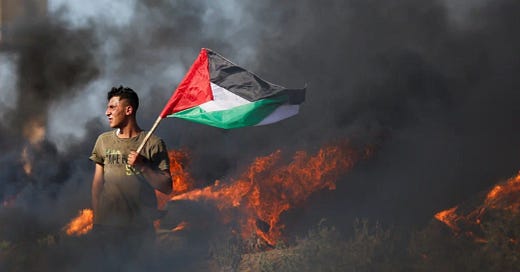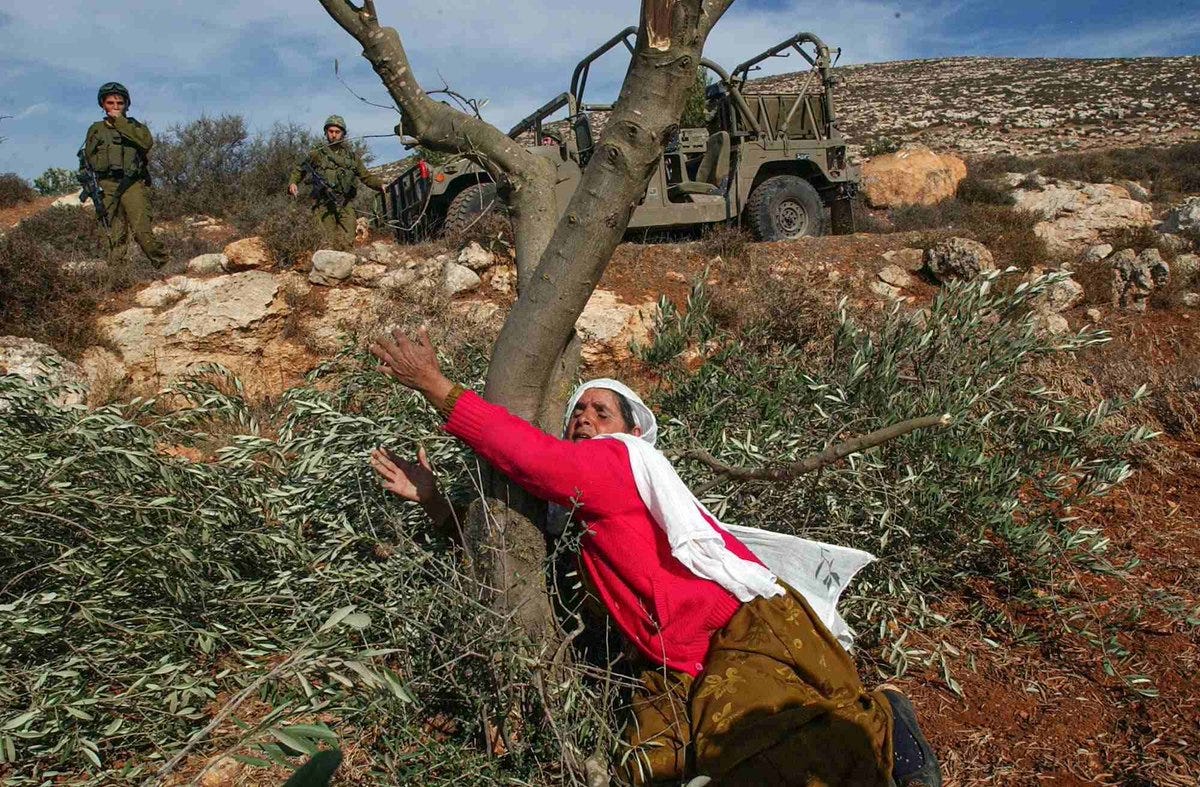Martyrs & Moral Clarity: Lessons From Palestine
Finding divinity not in worship but in resistance — how Palestinian resilience reveals the true message behind religious martyrdom
Yesterday, a friend and I found ourselves lying on the floor, because it was the only thing that felt comforting as the empire continued to crumble around us. Our conversation led to the usual deep thoughts, reflection, and clarity.
But something we discussed made me think about the concept of humanity in a whole new light.
Human beings, in general, struggle to think beyond the literal.
For example, although I do not consider myself a Christian, lately I’ve found myself thinking a lot about Jesus — not as a God or someone to be worshiped, but as a Palestinian man who never lost his sense of justice, his moral clarity, or his compassion. He never lost hope for himself and remained a beacon of hope for others simply by living authentically.
Jesus becoming a holy figure in the western world feels significant now more than ever, because we have seen Palestinians display more dignity, resilience, and unwavering humanity than many others on this earth combined–even as their own genocide and ethnic cleansing has become a live-streamed spectacle for the world stage.
The world is watching as Palestinians are murdered by their oppressors. Holding tightly to their own authenticity, they die refusing to bow to the pressure.
They are martyred.
Sounds familiar?
But Jesus never asked to be martyred, or for a cult-like following, or for his teachings to be compiled into a book so people could worship him. That would be the most simplistic take on his message. He simply urged people to hold tightly to their integrity and never lose hope — for themselves and for the world. He showed that if we do that, we can live together in a way that makes this earthly existence beautiful.
He literally died on that hill.
He died on that cross.
But most people struggle to grasp this. Rather than taking the words of those who preach justice and compassion as an opportunity to reflect inward — to ask how we can live better, love better, and be better — we see those who embody these ideals and assume they must be divine, something greater than human.
We have seen, even now, Palestinians being placed on a pedestal for their resilience.
We put others on pedestals because we cannot imagine that we, too, could live with that kind of purpose and righteousness.
And in a way, we aren’t wrong. Because people who live this way are different—not because they are supernatural, but because they refuse to be distracted. They hold onto their integrity, their decency, their conviction, regardless of the noise around them.
I believe religion, as a system, exists because most of us struggle to comprehend these qualities in their purest form. I believe the purpose of our existence is simple: to experience love, joy, hope, and freedom in this stunning, fleeting life, on a planet that is absolutely beautiful, if we actually take a moment to pause and look around.
And yet, here we are living in a time of tremendous turmoil — almost biblical in scale. The world is on fire, and still, so many refuse to recognize their own part in it.
Being raised Catholic, but choosing to live a secular life as an adult, I never expected to think about Jesus so much in my 40th year. But as I embed myself more deeply into the Palestinian resistance, I see his story more clearly. Not as the myth or the miracle, but as a man who lived under occupation, who stood unwavering against oppression, and who called upon people to resist — resist apathy, resist cruelty, resist the slow erosion of the soul.
Even now, as we watch people lose, sell, or abandon their own moral center — whether through distraction, temptation, or despair — we must hold firm. We must never lose hope that we, as individuals, will remain rooted in our own conscience, in our own truth, in our own unwavering sense of what is right.
Because as long as we hold onto that, we are not lost.
As Jesus and other “religious figures” have reminded us, divinity is not found in some distant heaven. It is here, now, within us.
We are all redeemable, as long as we take accountability for our actions, and never lose hope. If we hold tightly to righteousness, justice, and love, we will always be living in the divine, even as life as we know it crumbles around us.
The end is near. Climate catastrophe, genocide, empire falling. This wouldn’t be the first time the earth swallowed a bit of itself in order to make itself whole again. This is, in fact, the type of biblical destruction that holy books were written for.
Some of us will not make it through this historical turmoil. But maybe the point is not to make it through to see the new normal, where a new martyr will become the new holy figure that the masses aspire to meet in the afterlife after learning absolutely nothing from their teachings. Whether we do or do not make it is not the point. Maybe the point is simply to live authentically and take care of eachother while we’re here.
Yesterday, when I got up from that floor, I knew I would never lose hope for my own humanity. And that’s the most righteous thing I can offer this world.








Exquisite piece ❤️
I see the point you're making, but historically, Jesus was a Jewish man from Judea, not Palestinian. The region wasn't even called Palestine until long after he died. I think the parallels are interesting, but it is also important to keep his actual history in mind too.